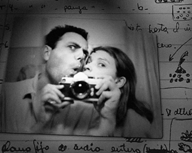Raymundo
 ARGENTINA / 2002 / Spanish / Color, B&W / Video / 127 min
ARGENTINA / 2002 / Spanish / Color, B&W / Video / 127 min
Director, Script, Editing, Sound: Ernesto Ardito, Virna Molina
Photography: Sebastian Diaz, Ernesto Ardito, Virna Molina
Animation, Graphics: Virna Molina
Research, Producer: Ernesto Ardito
Associate Producer: Juana Sapire
Source: Ernesto Ardito, Virna Molina
Paraguay 4554 1° “C” (1425) Buenos Aires ARGENTINA
Phone: 54-11-4775-5026
E-mail: nikargentina@ciudad.com.ar URL: www.filmraymundo.com.ar
Filmmaker Raymundo Gleyzer was abducted and killed by the Argentinean military dictatorship in 1976. This film depicts his life, as well as the history of anti-war cinema and liberation movements in Latin America during the 1960s and 1970s, with extensive usage of the films he left behind, home movies and archive footage. Through its brisk tempo, suspenseful developments and the enchanting music that envelops the entire film, memories and ideals that could not be destroyed by the CIA or the military junta are resurrected.
[Director’s Statement] The motivation that generated the realization of this film was: to recover for new generations the life and work of Raymundo Gleyzer. At the time that we initiated this project (1998), in Argentina there were only two of Raymundo’s films in precarious VHS format, but with the colaboration of Juana Sapire, widow of Gleyzer, we started to work in the search and recuperation of Raymundo Gleyzer’s complete work, unknown files of revolutionary cinema and the revolutionary struggles. Why? Because Raymundo was a filmmaker that with his creativity, perseverance and honesty, transformed his films into instruments for the political struggle of the working class in Argentina and Latin America. We don’t intend to mystify Raymundo’s figure, or to enclose him in a time capsule, but to act as a bridge for others to continue the struggle. That’s why this rediscovery is so important for the continuation of this kind of cinema.
We want not only to show his work, but his way of making films, his way of facing conflicts and his place in history. Raymundo’s life and films share the same coherence and faith in the people that inspired him to never give up the fight. His films were prohibited and later forgotten by following democracies. The reason for this? There are ideas they don’t want to hear again. They follow the politics of omission and historical distortion about the popular struggles of the 1970s. That is why it is so important to discuss the historical revisionism and political denunciations of Raymundo’s films and all revolutionary cinema, discussions that are now more valid than ever.
Raymundo Gleyzer’s work must be recovered because it is the cultural patrimony of the Argentine people. His school of filmmaking must be continued by new filmmakers, to make films with an Argentine identity and contribute to building a fair society, based in positive values for humankind.
 Virna Molina
Virna MolinaBorn in Buenos Aires in 1975. Studied at the Avellaneda Institute of Art and Film. Has made short fiction and documentary videos and films since 1993. Works professionally as an editor and in animation film. Worked with Ernesto Ardito from 1998 on Raymundo. |
Ernesto Ardito Born in Buenos Aires in 1972. Studied social communication at Buenos Aires University, and filmmaking at the Avellaneda Institute of Art and Film. Has made short fiction and documentary videos since 1993. Won an Argentine National Endowment for the Arts grant in 1998 and made the feature documentary Raymundo. |
